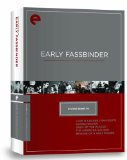| Reviews & Columns |
|
Reviews DVD TV on DVD Blu-ray 4K UHD International DVDs In Theaters Reviews by Studio Video Games Features Collector Series DVDs Easter Egg Database Interviews DVD Talk Radio Feature Articles Columns Anime Talk DVD Savant Horror DVDs The M.O.D. Squad Art House HD Talk Silent DVD
|
DVD Talk Forum |
|
|
| Resources |
|
DVD Price Search Customer Service #'s RCE Info Links |
|
Columns
|
|
|
Eclipse Series 39: Early Fassbinder
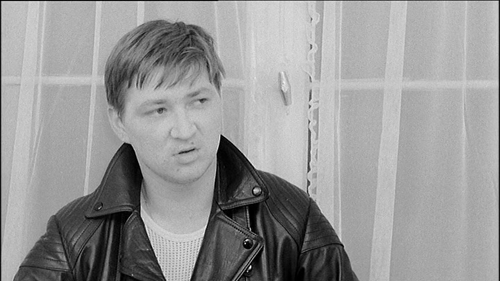
The Movies:
It needs to be said: the great German auteur Rainer Werner Fassbinder was damn prolific, and damn quirky, from the very start.
The starkness and searching characters common in his work is all over the five films assembled in Criterion's Eclipse Series 39: Early Fassbinder DVD box set, which were produced in a flurry of activity over 1969 and 1970. Only 25 years of age by the time he made this set's most recent film, these gritty dramas of disaffected youth reflected the numbed-out discontent Fassbinder and his peers were experiencing in postwar West Germany. These modest films have the clunkiness of a tyro with a lot to say but limited means with which to say it (especially the first two). However, they also share an uncompromising singularity of vision, since he directed, wrote, and often acted in every one - an unbelievably busy pattern that continued up until Fassbinder's early death in 1982.
The five stark, mostly black and white dramas assembled on Eclipse Series #39: Early Fassbinder reveal Fassbinder as a filmmaker who had a vision and strong sense of purpose almost from the very beginning. Although it's missing two of films from this period (the controversial Whity and What Makes Herr R. Run Amok?, which was perhaps given over to another director, Michael Fengler), the set has a remarkable consistency. Fassbinder's screenplays dealt with the alienation and bottled-up hostility of post-World War II Germany, especially as it applied to the younger generation. Most of the actors in these films came from members of the Antiteater Collective, a leftist group that Fassbinder co-founded to stage the kind of politically-infused dramas that Fassbinder felt were woefully underrepresented in German cinema. His regulars from this period included Hanna Schygulla, Fassbinder's muse and star of better-known later projects such as The Marriage of Maria Braun.
Eclipse Series #39: Early Fassbinder consists of the following films:
Love Is Colder Than Death (1969; 89 minutes)
Jeered at during its June 1969 premiere at the Berlin Film Festival, Fassbinder made an indelible impression with a clunky yet audacious first feature. In this minimalist take on American gangster archetypes, he director himself plays Franz, a seedy pimp serving time in prison. He befriends another inmate, Bruno (Ulli Lommel), a disaffected youth who convinces Franz to join the crime syndicate he works for. The duo plan a bank heist while Bruno becomes attracted to Franz's girlfriend, Johanna (Hanna Schygulla). The stark photography and odd timing (stilted dialogue and pauses held long enough to become uncomfortable) Fassbinder uses in Love Is Colder Than Death take some time to adjust to. It's bone dry, formal to a superficial degree, sluggishly paced, and somewhat too indebted to French New Wave films to truly stand on its own. Lovers of challenging cinema will find a lot to admire here, however. There are already signs of Fassbinder's quirkiness, such as the endless tracking shot of Lommel and Schygulla grocery shopping while otherworldly music plays on the soundtrack. With hindsight on how its 23 year-old auteur would develop, the film feels like the messy, inconsistent yet bracingly nihilistic work of an imaginative artist.
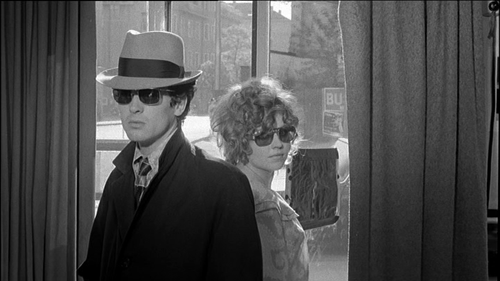
Katzelmacher (1969; 89 minutes)
For his second feature, Fassbinder fell back on familiar territory in adapting one of his own stage plays for the screen. Katzelmacher is anything but ordinary, however, since the film contains some of Fassbinder's most caustic observations on contemporary German society. Fassbinder employs a lot of the same rigid stylization from Love Is Colder Than Death in telling this story, dealing with a group of bored, agitated German youths who become even more hostile when an outsider intrudes on their insular clique. Like with his earlier effort, Katzelmacher depicts the fatalistic dullness of the characters with surprising clarity, making it boring in a fascinating way. Indeed, much of the first half is devoted to banal scenes of squabbling couples in an urban environment. They gossip, get drunk, take walks, and have passionless sex - either for free or with payment (an early sign of Fassbinder's equal opportunity nihilism: one of the guys frequently shacks up with a male prostitute). The dynamic of the group gets shaken up with the arrival of a Greek emigrant named Jorgos, played by Fassbinder. Renting a room from the landlady Elisabeth (Irm Hermann), Jorgos' presence causes the others to spread rumors that he raped a local woman, while two of the men discuss the idea of castrating him. One of the women becomes an unlikely friend to Jorgos, however. Marie (Schygulla), falls in love with the outsider and fantasizes to her friends that he'll take her to be his mistress back in Greece. Relentlessly gloomy, this particular film might be the most make-it-or-break-it prospect in the set. Many will undoubtedly see it as pointless and dull; I found it spellbinding.
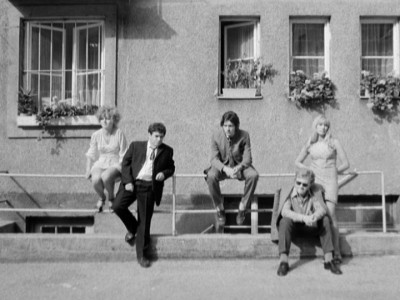
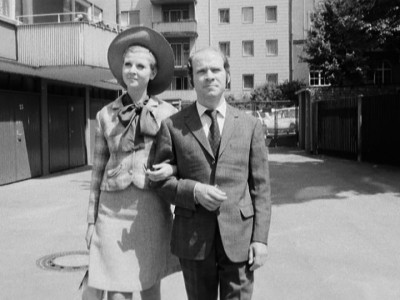
Gods of the Plague (1970, 92 minutes)
The emotionally stunted criminals and blank-faced prostitutes that fill Gods of the Plague have Fassbinder operating strictly within his comfort zone. His screenwriting is more concise here, however, and the man's increased ease with filmmaking makes this one more complementary with his later, more accessible work. His photography is sharper and more artfully composed, even flirting with some downright mainstream techniques such as aerial shots. An original music score supplants the random found music heard in the first two films, as well. Actor Harry Baer, who played one of the surly youths in Katzelmacher, displays a striking vulnerability here as a prematurely burnt-out ex-con named Franz. While the police are tailing him, Franz lies low and reconnects with his girlfriend Johanna (Schygulla), a spirited yet impetuous prostitute. Wanting to locate an ex-buddy who once shot and killed his brother, Franz gets involved with another woman, Margarethe (Margarethe von Trotta). Franz's friend Günther (Günther Kaufmann), an affable bruiser known as the Gorilla, eventually becomes the accomplice in a supermarket heist planned by the pair. Their crime is put into jeopardy by Johanna, however, who is sleeping with one of the cops investigating Franz's whereabouts. Schygulla gets another good role here, but this deliberately paced but worthwhile film is truly dominated by Baer and the quasi-homosexual bond he shares with Kaufmann's character.
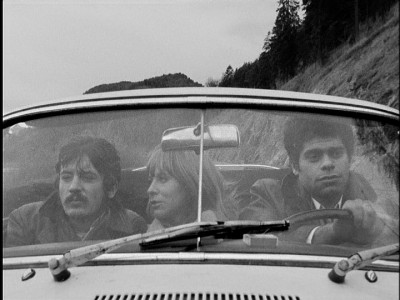
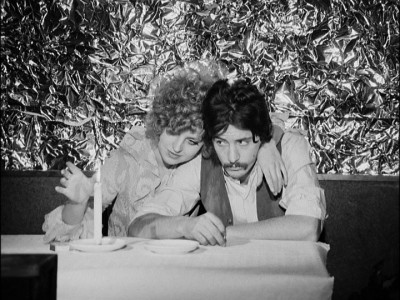
The American Soldier (1970; 80 minutes)
Another revisionist crime flick playing on film noir conventions (and, again, heavily influenced by the French New Wave), The American Soldier has Fassbinder going into familiar themes of alienation in telling the story of he-man American Vietman vet Ricky (Karl Scheydt) adjusting to life in grimy present day Munich. A hardened hit man, Sheydt's Ricky is hired by a trio of renegade cops to kill off some problem criminals. In the process, he sleeps with a prostitute (Elga Sorbas), seeks out a gypsy palm reader, visits his mother and brother, and reconnects with an old buddy (Fassbinder). Fassbinder's pacing is too lackluster for a story this vague, but the film almost makes it on its quirkiness alone. If Ricky's displaced 1940s gangster transplanted to modern Germany doesn't get you, perhaps the cozy living room equipped with a pinball machine or the soundtrack's incessantly repeated "Eastern guitars a-go-go" instrumental motif (co-written by Fassbinder) will. Fassbinder gets more aggressively experimental on The American Soldier, making it the most frustrating and elliptical of the films included here. Fassbinder's choices, including the agonizingly long scene that closes the film, push the envelope into avant-garde territory.
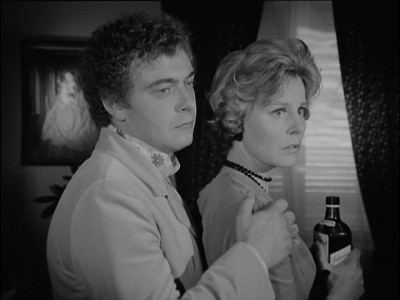
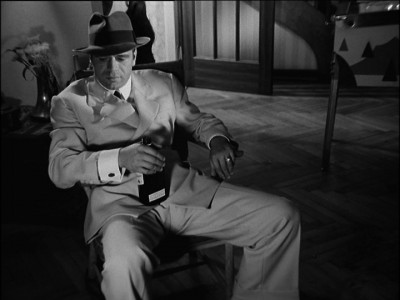
Beware of a Holy Whore (1970; 104 minutes)
Fassbinder's funky, heavily autobiographical tale of behind-the-scenes drama on a movie set plays like Day for Night directed by Robert Altman and starring Andy Warhol's Factory crowd. The film is basically a venting on Fassbinder's part, an unstructured series of vignettes in which the characters argue, rant, gossip, drink lots of Cuba Libres and throw glasses as they laze around a Spanish hotel waiting for film stock to arrive so they can resume production on their film. The cast of outsized characters include Fassbinder as the production manager, Hanna Schygulla as the beautiful lead actress, Alphaville's Eddie Constantine as the apathetic lead actor, Ulli Lommel as a meek underling, and (most memorably) Lou Castel as the hotheaded director. It's interesting watching this one in the context of the set, since the large cast is mostly populated with actors who appeared in all four of the other films (Fassbinder and Karl Scheydt even wear the same outfits from The American Soldier). In all honesty, however, it's an unpleasant film that even Fassbinder fans will find tough going. Knowing about the circumstances behind it (as explained in the set's notes, Fassbinder wrote and filmed it as an exasperated kiss-off to Antiteater and the workaholic pace he'd adopted since founding the group), its inclusion here makes a lot of sense.
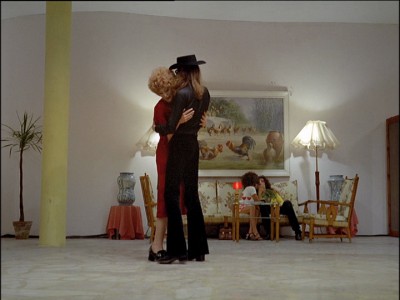
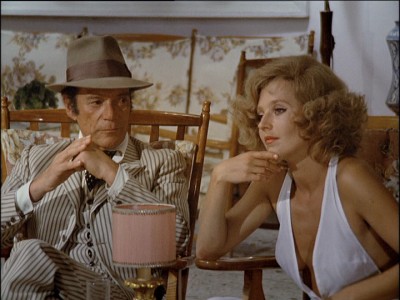
The DVDs:
Early Fassbinder is packaged similarly to other Eclipse sets, a paperboard slipcover holding together five clear slim-packs with one film to a disc. Aside from the fragility of the slim-packs (several in this review copy arrived cracked and chipped), it's an elegantly designed set in the usual Criterion manner.
Video
The grainy, high contrast photography in these films is nicely captured here in prints that show slight indications of aging and blown-out lighter areas. The color on Beware of a Holy Whore is nicely balanced with a print that is somewhat better preserved than the others. Other than shakiness on a few scenes Gods of the Plague, the transfers are pretty clean and appealing. Love Is Colder Than Death is given a widescreen 16x9 anamorphic presentation, while the others are in a 1.33:1 aspect ratio. All are consistent with how they were originally filmed.
Audio
Good. All five films have their decent original monoaural soundtracks as the sole listening option, in mixes that sport clear dialogue and sound effects. The only complaint I'd have is that some music is mixed in a shill, distorted manner (when it isn't used as background, like in Beware of a Holy Whore). Optional English subtitles are provided.
Extras
None on the discs themselves, although each film comes with an informative essay from cinephile Michael Koresky.
Final Thoughts:
The films of Rainier Werner Fassbinder are not for everyone. The five grim dramas that comprise Eclipse Series 39: Early Fassbinder are slow paced, often pretentious, and delve into subjects that aren't all that pretty. They all supply a ton of insight into his indignant early years, however. For a man who was barely in his twenties, the artistry and quirkiness of these films have imprint of a major filmmaker. What's the German word for "surprising"? Recommended.
Matt Hinrichs is a designer, artist, film critic and jack-of-all-trades in Phoenix, Arizona. Since 2000, he has been blogging at Scrubbles.net. 4 Color Cowboy is his repository of Western-kitsch imagery, while other films he's experienced are logged at Letterboxd. He also welcomes friends on Twitter @4colorcowboy.
|
| Popular Reviews |
| Sponsored Links |
|
|
| Sponsored Links |
|
|
| Release List | Reviews | Shop | Newsletter | Forum | DVD Giveaways | Blu-Ray | Advertise |
|
Copyright 2024 DVDTalk.com All Rights Reserved. Legal Info, Privacy Policy, Terms of Use,
Manage Preferences,
Your Privacy Choices | |||||||









